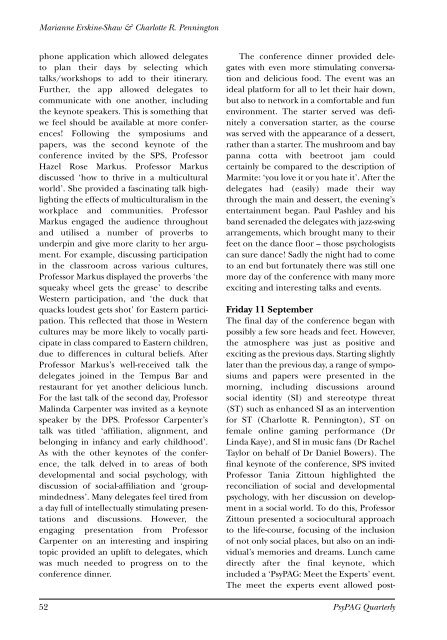Social Psychology Special Issue
PsyPAG-Quarterly-Issue-973
PsyPAG-Quarterly-Issue-973
You also want an ePaper? Increase the reach of your titles
YUMPU automatically turns print PDFs into web optimized ePapers that Google loves.
Marianne Erskine-Shaw & Charlotte R. Pennington<br />
phone application which allowed delegates<br />
to plan their days by selecting which<br />
talks/workshops to add to their itinerary.<br />
Further, the app allowed delegates to<br />
communicate with one another, including<br />
the keynote speakers. This is something that<br />
we feel should be available at more conferences!<br />
Following the symposiums and<br />
papers, was the second keynote of the<br />
conference invited by the SPS, Professor<br />
Hazel Rose Markus. Professor Markus<br />
discussed ‘how to thrive in a multicultural<br />
world’. She provided a fascinating talk highlighting<br />
the effects of multiculturalism in the<br />
workplace and communities. Professor<br />
Markus engaged the audience throughout<br />
and utilised a number of proverbs to<br />
underpin and give more clarity to her argument.<br />
For example, discussing participation<br />
in the classroom across various cultures,<br />
Professor Markus displayed the proverbs ‘the<br />
squeaky wheel gets the grease’ to describe<br />
Western participation, and ‘the duck that<br />
quacks loudest gets shot’ for Eastern participation.<br />
This reflected that those in Western<br />
cultures may be more likely to vocally participate<br />
in class compared to Eastern children,<br />
due to differences in cultural beliefs. After<br />
Professor Markus’s well-received talk the<br />
delegates joined in the Tempus Bar and<br />
restaurant for yet another delicious lunch.<br />
For the last talk of the second day, Professor<br />
Malinda Carpenter was invited as a keynote<br />
speaker by the DPS. Professor Carpenter’s<br />
talk was titled ‘affiliation, alignment, and<br />
belonging in infancy and early childhood’.<br />
As with the other keynotes of the conference,<br />
the talk delved in to areas of both<br />
developmental and social psychology, with<br />
discussion of social-affiliation and ‘groupmindedness’.<br />
Many delegates feel tired from<br />
a day full of intellectually stimulating presentations<br />
and discussions. However, the<br />
engaging presentation from Professor<br />
Carpenter on an interesting and inspiring<br />
topic provided an uplift to delegates, which<br />
was much needed to progress on to the<br />
conference dinner.<br />
The conference dinner provided delegates<br />
with even more stimulating conversation<br />
and delicious food. The event was an<br />
ideal platform for all to let their hair down,<br />
but also to network in a comfortable and fun<br />
environment. The starter served was definitely<br />
a conversation starter, as the course<br />
was served with the appearance of a dessert,<br />
rather than a starter. The mushroom and bay<br />
panna cotta with beetroot jam could<br />
certainly be compared to the description of<br />
Marmite: ‘you love it or you hate it’. After the<br />
delegates had (easily) made their way<br />
through the main and dessert, the evening’s<br />
entertainment began. Paul Pashley and his<br />
band serenaded the delegates with jazz-swing<br />
arrangements, which brought many to their<br />
feet on the dance floor – those psychologists<br />
can sure dance! Sadly the night had to come<br />
to an end but fortunately there was still one<br />
more day of the conference with many more<br />
exciting and interesting talks and events.<br />
Friday 11 September<br />
The final day of the conference began with<br />
possibly a few sore heads and feet. However,<br />
the atmosphere was just as positive and<br />
exciting as the previous days. Starting slightly<br />
later than the previous day, a range of symposiums<br />
and papers were presented in the<br />
morning, including discussions around<br />
social identity (SI) and stereotype threat<br />
(ST) such as enhanced SI as an intervention<br />
for ST (Charlotte R. Pennington), ST on<br />
female online gaming performance (Dr<br />
Linda Kaye), and SI in music fans (Dr Rachel<br />
Taylor on behalf of Dr Daniel Bowers). The<br />
final keynote of the conference, SPS invited<br />
Professor Tania Zittoun highlighted the<br />
reconciliation of social and developmental<br />
psychology, with her discussion on development<br />
in a social world. To do this, Professor<br />
Zittoun presented a sociocultural approach<br />
to the life-course, focusing of the inclusion<br />
of not only social places, but also on an individual’s<br />
memories and dreams. Lunch came<br />
directly after the final keynote, which<br />
included a ‘PsyPAG: Meet the Experts’ event.<br />
The meet the experts event allowed post-<br />
52 PsyPAG Quarterly


